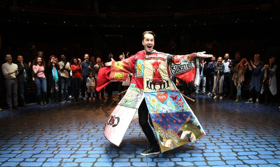Actors' Equity Renames Chorus Celebration 'Legacy Robe'

Actors' Equity Association has announced that a new name has been chosen for the tradition formerly known as the "Gypsy Robe." Moving forward, the Robe and tradition will be referred to as the "Legacy Robe" - a name chosen by members in a survey.
"The Legacy Robe reminds us why our tradition exists. It emphasizes the history of Chorus performers, their years of dedication and hard work and just how essential they are to every Broadway musical," said Mary McColl, Executive Director of Actors' Equity. "The ceremony on opening night will go on like it has for years, and I look forward to celebrating another season's long serving Chorus performers with recognition of their professionalism as they receive the Legacy Robe."
The name change came following a multi-step process that included a vote of Equity's National Council, and recommendations from Equity's Advisory Committee on Chorus Affairs and National Equal Employment Opportunity Committee. Following that, members voted on the name change in a survey.
The name "Legacy Robe" describes the tradition that occurs on opening night of every Broadway chorus musical. The Robe is given to the Chorus member that has worked the most Broadway chorus contracts.
While the original name was intended by members to be an honorific, the name change was made to recognize that the usage of the former name no longer has that impact, but is instead insensitive. As a Union for actors and stage managers, Equity has an obligation to lead by example on this issue.
The next presentation of the Legacy Robe will take place on July 26 at the Hudson Theatre, where the musical Head Over Heels will open.
Following the tradition, the Robe recipient circles the stage three times while cast members reach out and touch the Robe for good luck. The recipient of the Robe then visits each dressing room to "bless" the show. A decorative panel representing their show is then sewn onto the Robe, which is passed on to a recipient in the next chorus musical that opens.
This ritual began in 1950 when Bill Bradley, a Chorus member of Gentlemen Prefer Blondes, persuaded fellow Chorus member Florence Baum to give him her dressing gown. As a lark, he sent it to a friend, Arthur Partington, a Call Me Madam Chorus member, on opening night, telling him it had been worn by all the Ziegfeld beauties. Arthur added a rose from star Ethel Merman's gown and sent it to a chorus member on the next opening night of Guys and Dolls.
It was then passed from show to show and was often presented to a friend of the previous recipient or awarded to a chorus member based on popularity. Through the decades, the passing of the Robe became a specific ceremony with official rules stating how it is to be presented, worn and paraded on stage. Three retired Robes are at the Lincoln Center Library of the Performing Arts; there are also Robes at the Smithsonian Institute in Washington, DC, and at the Museum of the City of New York. All others are with Actors' Equity.
Actors' Equity Association, founded in 1913, is the U.S. labor union that represents more than 51,000 professional actors and stage managers. Equity endeavors to advance the careers of its Members by negotiating wages, improving working conditions and providing a wide range of benefits (health and pension included). Member: AFL-CIO, FIA. www.actorsequity.org #EquityWorks
Photo Credit: Walter McBride / WM Photos

Videos

